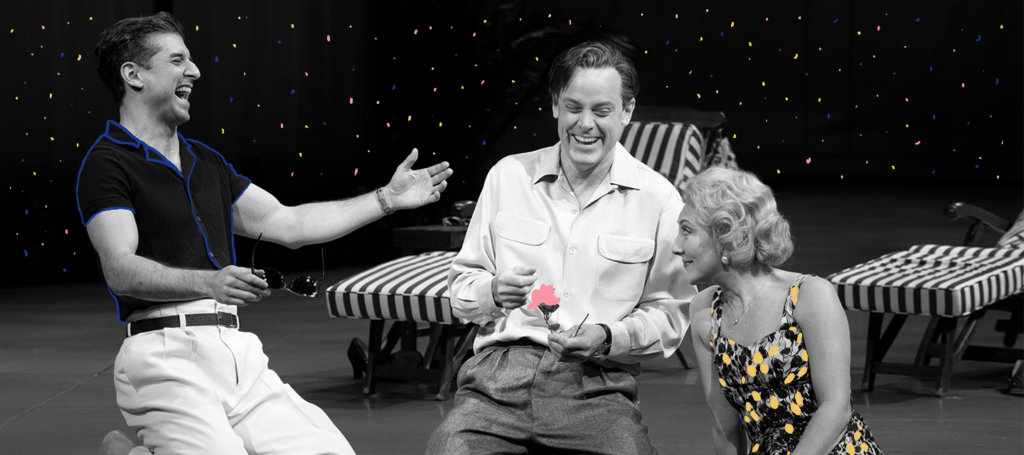


‘Flying Over Sunset’: A Trippy Spectacle with Not a Lot to Say
There is something inherently spiritual in the ways in which the writer and philosopher Aldous Huxley spoke of his relationship with the hallucinogenic drug, LSD. “It’s a very salutary thing to realize that the rather dull universe in which most of us spend most of our time is not the only universe there is. I think it’s healthy that people should have this experience,” he wrote in his book Moksha.
Huxley (played by Harry Hadden-Paton) and other public intellectuals who experimented with LSD—actor Cary Grant (Tony Yazbeck), politician Clare Boothe Luce (Carmen Cusack), and author and philosopher Gerald Heard (Robert Sella)—find themselves at the center of a new Broadway musical, Flying Over Sunset, directed by James Lapine with music by Tom Kitt and lyrics by Michael Korie.
Against a very trippy, fluid, and fantastic stage design—kudos to designer Beowulf Boritt, the projectionists at 59 Productions, Production Stage Manager Rick Steiger and 1st and 2nd Assistant Stage Managers Janet Takami and Andrea Cibelli—Huxley, Grant, and Luce experiment with the drug under Heard’s guidance. They all meet in Malibu to share the experience of partaking in LSD together. But what could’ve been a fantastic reimagination of the heightened genius of all the protagonists, becomes an overlong, sometimes trite replaying of their clichéd griefs and insecurities.
There is a scene where Huxley sees Boticelli’s “The Return of Judith to Bethulia” come to life in a Rexall pharmacy. Against the wonderful shape-shifting set, the minds of Boticelli and Huxley meet and all we see is Judith saying something about being made a scapegoat by a man’s imagination, as Heard and Maria Huxley (Laura Shoop) try escorting a tripping Aldous Huxley out of the drugstore.
The musical is in such a rush to move from one beautiful set to another, that there is not enough delving into the situations and hallucinations at hand. And yet, the play drags on, with each act overestimating the audience’s interest.
All the actors fit their roles but are reduced to being somewhat caricatures. Hadden-Paton plays a convincing grieving Huxley but is at the mercy of a role that makes the author come across as a facts-spouting know-it-all.
Cusack, who is an amazing performer, is trapped in an unkind script that can’t concentrate on the checkered genius of Clare Boothe Luce without losing its way into establishing her as an absentee mother who climbed the social ladder. Even when she sings a heart-rending “How?” after meeting the imagined ghosts of her mother and daughter, it’s difficult to feel sorry for her loss.
A potential foray into the intriguing dualities of Cary Grant’s left-leaning politics and his deep friendship with men like Howard Hughes is avoided, as he is reduced to the oft-seen “an actor imprisoned by his own image” persona. In a scene in his psychiatrist’s office, Yazbeck tap dances like a dream with his younger self (Atticus Ware) while the two sing the very catchy “Funny Money”, and I wish we got to see more of that side of the actor. Instead, the musical’s focus is on his very chiseled body—complete with a scene where Grant appears in swimming trunks—and does very little to tease out the man eclipsed behind the actor’s superstardom; which Yazbeck is truly equipped to play. A completely gag-ish over-sexualized impersonation of Sophia Loren (by actor Emily Pynenburg), as a part of Grant’s LSD-induced daydream, limits the play’s potential to grow beyond the stereotypes that one associates with actors, the film industry, and the drug culture within it.
The shallowest treatment is perhaps reserved for Gerald Heard. His deep interest in Vedanta philosophy is reduced to some arbitrary chanting of Hindu chants, in a diction that is reminiscent of someone in a Brooklyn yoga studio, instead of a man who studied meditation for years and took a deep interest in parapsychology. With the character’s lusting after Cary Grant in the middle of a meditation session, not only are his deep knowledge and spirituality made fun of, but it brings forth an extremely immature and flippant portrayal of homosexual attraction.
For a script that takes such a fantastic leap of imagination, Flying Over Sunset, unfortunately, recoils back into the safety of clichés before it can start spreading its wings of fantasy. It takes three very charismatic personalities but serves them to the audience as half-baked figures, stuck in-between the “rather dull” everyday universe of their problems and the magical stars whose lives we can only make sense of through fables and dreams.
Keep Reading

‘Company’: A Glorious Revival Revolves Around an Empty Role
It’s never a good thing when the only praise you have for the central performer in the revival of a groundbreaking musical is, “She’s very pretty.” Unfortunately, that, and a pleasant voice, are all that Katrina Lenk brings to her performance as the cipher, Bobbie, in this otherwise marvelous revival of Company. Yes, that’s Bobbie, […]
Read More
‘Harry Potter and the Cursed Child’: Come for the Nostalgia, Stay for the Spectacle
The moment you walk into the Lyric Theatre the magic of the Potter world hugs you. Just as they have done in Universal Studios, with the flick of their wand, The Wizarding World of Harry Potter invites you to join them on a new expedition. The welcoming warm glow of faux candlelight, the gold-trimmed accents, […]
Read More












